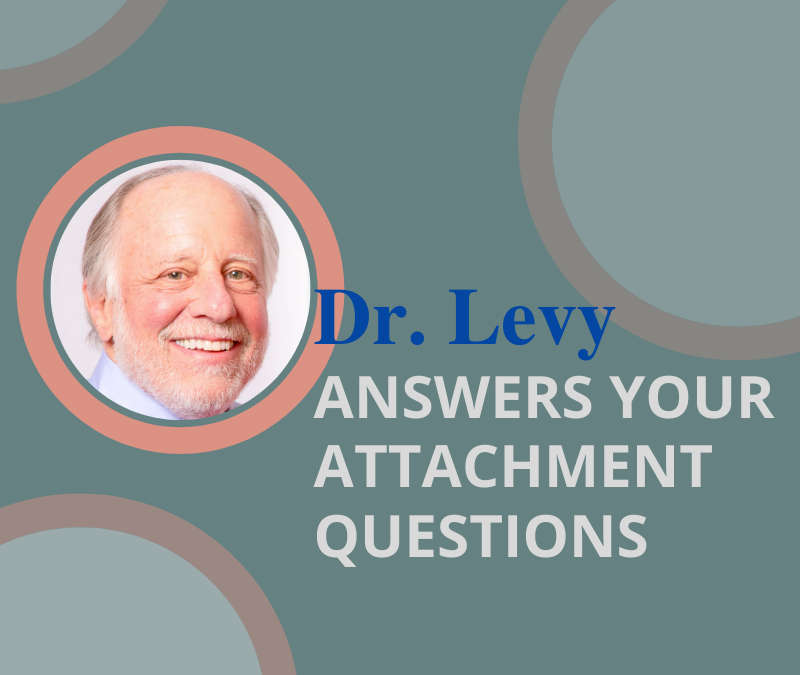Each month, Dr. Levy answers a common question he has received from professionals, caregivers and parents during three decades of pioneering work on attachment theory, treatment and training.
Q. How is Corrective Attachment Parenting different than parenting in general?
A. Corrective Attachment Parenting is focused on meeting the needs of children who have experienced maltreatment, significant losses and disrupted attachment. Parenting such children is challenging because they are typically mistrustful, angry, defensive, defiant and reluctant to be emotionally close. The primary goal of Corrective Attachment Parenting is to create positive change. Through thoughtful and corrective actions, reactions and a safe and constructive emotional environment.
The basics of corrective attachment parenting – compassionate care, appropriate structure and mutual respect – are also the foundation of good parenting in general. But general parenting strategies that work with many children often fail miserably with attachment disordered children.
Many children with attachment disorders are adopted by well-meaning parents who are ill-prepared to handle their severe emotional and behavioral problems. These children are unable to give and receive love and affection, constantly defy parental rules and authority, are physically and emotionally abusive to caregivers and siblings, and create ongoing stress and turmoil in the family. As a result of insufficient preplacement services (education, training, support, matching) and postplacement services (individual and family therapy, parent education, support) family members and marriages suffer.
Effective parenting requires the maturity to look in the mirror (have self-awareness); the patience to remain calm; the firmness to set appropriate limits; the heartfelt desire to give plenty of caring, compassion and love; and the flexibility to meet the unique needs of the child. To be a therapeutic parent, parents need the right information, skills, support, attitude, self-awareness and hope.
Therapeutic parents realize that their relationship with their child is the primary vehicle for creating positive change. Through thoughtful and corrective actions, reactions, and a safe and constructive emotional environment, parents can foster positive behaviors, character traits, mindsets, and brain growth. Parents help shape the growth of their child’s brain by helpful and healing experiences. Brain cells (neurons) “fire” during social and emotional experiences, and neurons firing together facilitate the growth of new connections, causing a “rewiring” in the brain.
Corrective Attachment Parenting
Specific parenting goals and skills parents learn:
- Creating a healing environment that fosters connection
- Providing clear and consistent structure
- Caring for self and partner
- Communicating effectively and calmly
- Providing choices and consequences
- Increasing family participation and cooperation
- Parenting creatively
- Competency-based parenting
- Approaching parenting challenges with hope, faith and positivity
Basic objectives of effective parenting (goals for children):
- Develop the capacity to form secure attachments and reciprocal relationships; the ability to give and receive love and affection.
- Develop the internal resources necessary to make healthy choices, solve problems, and manage adversity effectively.
- Cultivate a positive and realistic sense of self and self-in-relation to the world.
- Learn to identify, manage and express emotions in a constructive manner.
- Learn prosocial values and morality, as well as the self-discipline and self-control necessary to function successfully in society.
- Develop the capacity for joy, playfulness and positive meaning in life.
The mission of Corrective Attachment Parenting is to provide healing so that children can develop the behaviors, skills and abilities that are essential for success in life. This means, teaching these children to be able to make connections and receive affection, view themselves and others in positive ways, communicate emotions in a constructive manner, make healthy choices, maintain healthy relationships and experience joy, playfulness and a sense of hope.
Previous articles addressed questions about the Seven Functions of Secure Attachment, the Dependency Paradox, the importance of talking about trauma, the First Year Attachment Cycle, traits of successful and healthy adult relationships, the importance of hope as a part of treatment for trauma, the core concepts of child development, parenting strategies for deescalating conflict and the importance of touch to fostering attachment.



I would like to know if Dr Levy offers parenting classes for help with Corrective Parenting Attachment. Does he schedule virtual appts so we can learn about this?
No parenting classes, only IOP (Intensive Outpatient Psychotherapy) programs. You can order the book, “Healing Parents” from website: http://www.evergreenpsychotherapycenter.com. The book explains Corrective Attachment Parenting.